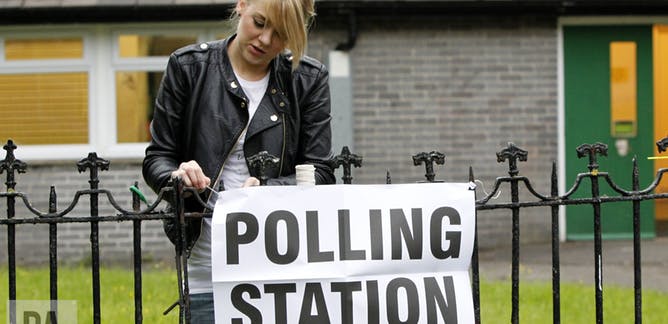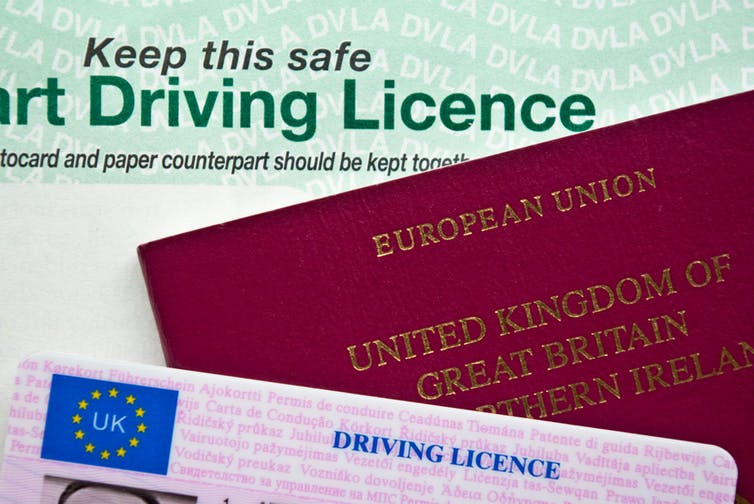Everyone welcome? PA/Peter Byrne
Guest post by Ben Stanford, Coventry University
Amid mounting concerns about electoral fraud, the Electoral Commission recommended in 2014 that people in Great Britain should have to prove their identity when voting.
The 2017 Conservative party manifesto pledged to “legislate to ensure that a form of identification must be presented before voting”. To test the waters for this, the Cabinet Office recently revealed that a pilot studywould be conducted in the May 2018 local elections. ID will be required at polling stations in five areas of England: Bromley, Gosport, Slough, Watford and Woking.
This gradual drive towards compulsory voter identification in Great Britain (it’s already compulsory in Northern Ireland) has encountered some strong opposition from campaign groups. The Labour party has also argued that its traditional voter demographic will be the most affected by the reforms.
The debate around compulsory ID has been most intense in places where disenfranchisement has been a widespread problem in the past – most notably the US. There has been a distinct lack of scrutiny in much of Europe, even though several countries already require ID. This divergence is to some extent understandable. The blatant racial discrimination that has shaped much of the political and social history of the US has added to concern that voter ID is leading to disenfranchisement among minority groups.
However one must not forget that it took many centuries for the voting franchise in the UK to be expanded beyond a narrow circle of wealthy, middle and upper class men. It was not until relatively recently that women, the young and the working class were allowed to vote. We must be alert to anything that could reverse that expansion.
‘Restoring confidence’ in democracy
According to the 2017 Conservative party manifesto, voter ID is needed to ensure that the public has “confidence” in democracy. While electoral fraud undoubtedly has the potential to shake the public’s confidence in the democratic process, even if conducted on a low scale with little bearing upon election results, we must put things into perspective. Of the 51.4m votes cast in the various elections in 2015 in the entire UK, there were 481 allegations of electoral fraud. Of those, only 123 concerned the actual voting process. This figure includes not just impersonation but also breaches of secrecy, tampering with ballot papers, bribery and treating (providing refreshments or entertainment to “corruptly influence”) or undue influence.
Should the government press ahead, the implications for certain members of the electorate could be drastic, depending on how strict the identification requirements are. According to the Electoral Commission’s own estimates, about 7.5% of the electorate (3.5m electors) in Great Britain do not own one of the forms of identification that the commission recommended should be required to vote in polling stations. If only passports, photographic driving licences and Oyster photocards were to be accepted, this would leave 13% of the electorate (6m electors) unable to vote.
If only passports and photographic driving licences were to be accepted, the commission estimated that 24% of the electorate (11m electors) would be unable to vote. Some of these documents are, of course, particularly expensive forms of government-issued identification. They may be unaffordable to those with limited means and many UK citizens do not need them in the first place so would have to buy them specifically to vote.
ID doesn’t come for free. Shutterstock
Other worrying questions concern the likely impact of strict identification on minority groups who are statistically less likely to possess certain forms of identification. For example, according to the 2011 census, only 66% of people who identify as white gypsy or Irish travellers hold eligible passports. That compares to 83% of white English/Welsh/Scottish/Northern Irish/British people and 85% of mixed/multiple ethnic groups (white and black Caribbean).
Women, young people and the elderly are also far less likely to possess a driving licence than others. At the most extreme, recent statistics compiled by the Department of Transport revealed that in England, 91% of males aged 50-59 own driving licences in comparison to just 29% of females aged 17-20.
Bearing these concerns in mind, it is reassuring that the Electoral Commission has recommended that a free form of photographic identification should be available for voters in Great Britain, similar to the Electoral Identity Card used in Northern Ireland. Nevertheless, if care is not taken to simplify the application process, recent experience in the US suggests that there can be considerable hidden costs when it comes to acquiring such documentation.
If universal and equal suffrage is to be genuinely preserved in Great Britain, it is imperative that there are no financial obstacles when it comes to voting or when acquiring the documentation required to vote.
Originally written for ‘the Conversation’.





Comments are disabled